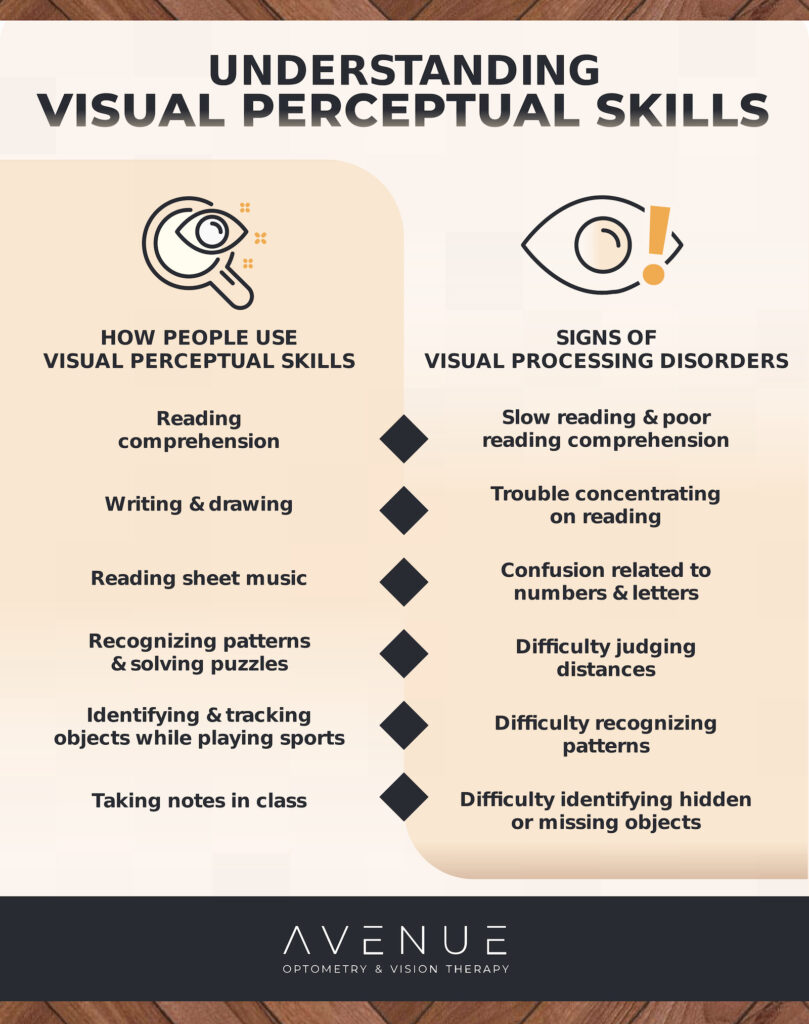Visual perceptual skills are the processes your brain and eyes use to interpret and understand what you see. Even with 20/20 vision, a person can experience vision issues because of challenges related to their visual skills.
The connection between your brain and your vision is essential for seeing comfortably and clearly. Different conditions can disrupt that connection and weaken certain visual skills, leading to blurry vision, eye strain, headaches, and reading comprehension challenges. Vision therapy offers a solution to challenges related to visual skills.
Through vision therapy, kids and adults can train their eyes and brain to work more closely together. In addition to supporting children’s visual development, vision therapy can help address vision-related concussion symptoms. You can even train your eyes for sports with a tailored vision therapy program.
How Do People Use Visual Perceptual Skills?
Visual perceptual skills help you interpret the details of what you’re looking at—such as the players on a field or a pattern of numbers on a whiteboard—process that information, and take action—such as by passing a ball to an open player or writing the next number in a sequence.
When you use your eyes for specific tasks, you’re using visual perceptual skills. Children studying their notes, playing sports, or looking for a matching sock on a bedroom floor use visual perceptual skills in different ways.
In the Classroom
Visual skills are a key part of many kids’ learning experiences—80% of children’s learning is visual, and many common classroom activities rely on visual processing skills, including:
- Reading
- Writing
- Solving puzzles and following patterns
- Solving math problems
Many reading issues can be connected to visual processing skills, such as skipping lines of text, losing your place, and mixing up the letters b, d, p, and q. These issues can also lead to a potential misdiagnosis of attention deficit hyperactivity disorder (ADHD) and other learning-related conditions.
During Sports
Sports use a variety of specific visual perceptual skills. Visual processing can be important for any of the following actions:
- Distinguishing player numbers, such as the difference between 3 and 8 on someone’s jersey.
- Finding a loose ball, puck, ring, or another small object among a group of players and other objects.
- Identifying, remembering, and mentally tracking the positions of teammates and opposing players.
- Judging the distance between 2 different objects, such as a teammate and a defending player or a small object and a net.
Many visual skills come into play during sports, including those beyond visual processing, such as eye movement control, changing focus between near and far objects, and hand-eye coordination. With a tailored sports vision program, you can identify and train the specific visual skills you or your child rely on for sports.

What Are the Common Visual Perceptual Skills?
There are 17 common visual skills that vision therapy programs can help strengthen and develop. Under that overarching umbrella of general visual skills, you can also identify several areas where people use specific visual perceptual skills, including:
- Visual memory: The ability to store and recall information when necessary, including information about objects or details in a specific order, which uses visual sequential memory.
- Visual form constancy: The ability to distinguish similar, separate objects, such as the numbers 3 and 8 or the lowercase letters b and d.
- Visual figure-ground perception: The ability to find specific objects in a larger cluster and isolate them.
- Visual-spatial relations: The ability to distinguish separate objects near each other in your environment, such as nearby buildings or people standing in front of each other.
- Visual closure: The ability to recognize objects when part of them is missing or fill in visual details from images with missing information.
- Visual discrimination: The ability to identify specific details and differences in similar images and objects.
- Visual attention: The ability to focus on important visual details and filter out other information.
What Is a Visual Processing Disorder?
A visual processing disorder is a condition that affects a person’s ability to understand the information they’re seeing and fully utilize their visual processing skills. A visual processing disorder may affect any of the areas of vision and may cause a range of visual challenges.
For some people with a visual processing disorder, learning can be more challenging, and they may need to see information more times to fully interpret, remember, and understand it. They may experience specific difficulties with tasks that involve matching visual information to other senses, like reading sheet music where vision needs to be coordinated with hearing.
What Are the Signs of a Visual Processing Disorder?
The effects of visual processing disorders can vary, but common symptoms include:
- Slow reading speeds and other reading challenges
- Confusion related to numbers and letters
- Difficulty finding information in textbooks
- Losing your place when reading out loud
- Trouble finding missing items or identifying specific details
- Difficulty judging distances
- Difficulty recognizing patterns
These issues can be related to various learning challenges and conditions. An eye exam can help identify the cause and get the proper support.
How Are Visual Processing Issues Treated?
Vision therapy is an excellent option for managing visual issues that can’t be addressed with glasses, contact lenses, and other treatments. Vision therapy involves customized at-home and in-office exercises designed to help strengthen the connection between your eyes and brain. At Avenue Optometry & Vision Therapy, we use evidence-based vision therapy techniques to help individuals improve their visual processing skills. Our program is tailored to each individual’s needs and goals and includes modern treatment options like virtual reality tools and comprehensive eye-tracking diagnostic equipment. Let’s talk about visual perceptual skills and vision therapy in person. We would love to answer all your questions. Book an appointment today.




